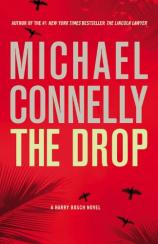The Drop
Review
The Drop
The title of Michael Connelly’s new Harry Bosch novel refers to a couple of things throughout the course of the book. In ascending order, DROP is the acronym for “Deferred Retirement Option Plan,” a mechanism by which members of the LAPD and LAFD can retire and then immediately return to work for a period of up to five years. The pension benefits that they otherwise would receive accumulate with interest and are paid at the end of their second employment period. The length of Bosch’s DROP period (for reasons too complex to go into here) is being resolved as the story opens. It is a matter of some concern for Bosch, given that he is a single parent with a teenage daughter who will be attending a college or university at some point in the future. The issue hangs quietly throughout the book --- not a sword of Damocles by any means, but certainly a carrot at the end of a stick.
"Connelly continues to push the [Harry Bosch] series, and its character, to new and greater heights."
The title also refers to one of two investigations that Bosch and his partner, David Chu, have taken on, one of which is far beyond the mission of the Open-Unsolved unit to which they are assigned. George Irving, the son of powerful councilman Irvin Irving, has fallen to his death from the balcony of his room at the Chateau Marmont. Irvin has long been antagonistic toward the LAPD, especially to Bosch, who is stunned when the councilman insists that Bosch heads up the investigation into his son’s death. Bosch can reach one of three conclusions: death by suicide, accident, or murder.
The investigation takes several twists and turns, all of them deep, dark and fascinating, as Bosch attempts to take what little evidence there is and follow it to its sometimes illogical conclusion. The deceased, it turns out, was an influence peddler with a few high-powered clients and who may or may not have been selling access to his powerful father. Bosch is hamstrung in the investigation from the start, not only by Irvin himself but also by the press, as well as by… But that would be telling. Suffice to say that Bosch may be developing into a bit of a Grumpy Gus in his maturity, but the fact that he does so is not without reason.
I mentioned above that there were two cases that Bosch was given. The other is an open/unsolved case, a heartbreaking file from 1989 concerning the rape and murder of a young woman. Bosch and Chu initially receive the case because of an apparent incident of evidence contamination. A blood sample found at the scene of the crime matches that of Clayton Pell, a 29-year-old convicted sex offender. The problem is that Pell would have been eight years old at the time of the murder.
Bosch tracks down Pell at a voluntary halfway house. What follows is an extremely interesting interplay between them; Bosch is repulsed by who and what Pell is, while Pell is naturally distrustful of the police in any form. Both men slowly, though never entirely, overcome their adverse feelings toward each other, as Bosch gradually extracts information from Pell that puts him on the trail of a killer who has been pursuing a mind-numbing mission for decades, under the radar of the city and the police. The open-unsolved case and the Irving death leave Bosch transformed at book’s end.
Connelly continues to push the series, and its character, to new and greater heights. While the events here do not quite rock Bosch’s world in the same way that those in NINE DRAGONS did, Connelly leaves much open for Bosch at the end of THE DROP, both personally and professionally. Anything and everything might happen when the next Bosch book drops.
Reviewed by Joe Hartlaub on December 1, 2011





